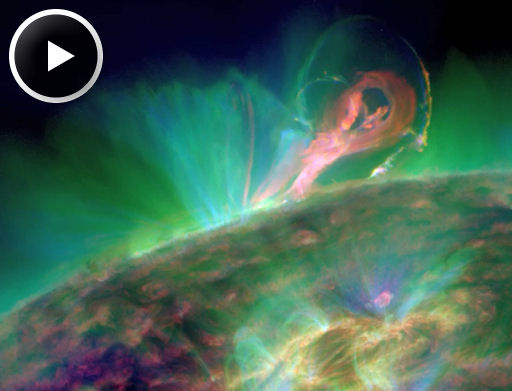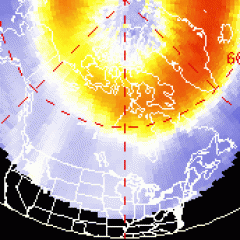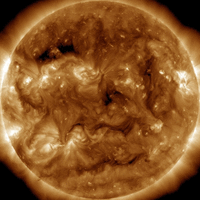SLIGHT CHANCE OF STORMS: NOAA forecasters have downgraded the odds of geomagnetic storms around the poles today to 15%. Bright auroras are unlikely as Earth's magnetic field remains quiet. Aurora alerts: text, voice.
ANOTHER ERUPTION MISSES EARTH: Magnetic fields around departing sunspot AR1621 became unstable and erupted during the late hours of Dec. 7th, hurling a bulb of plasma off the sun's western limb. NASA's Solar Dynamics Observatory recorded its departure:
Earth was not in the line of fire. No auroras or other space weather effects will be felt as a result of the blast.
Overall, solar activity is very low. The face of the sun is nearly blank (few sunspots) and NOAA forecasters estimate a slight 1% chance of strong flares during the next 24 hours.

![]()
Solar wind
speed: 267.2 km/sec
density: 3.0 protons/cm3
explanation | more data
Updated: Today at 1625 UT
![]()
X-ray Solar Flares
6-hr max: B8 1022 UT Dec08
24-hr: B9 0425 UT Dec08
explanation | more data
Updated: Today at: 1600 UT
![]()
![]()
![]()
Daily Sun: 08 Dec 12
![]()
![]()
None of the sunspots on the Earthside of the sun pose a threat for strong flares. Credit: SDO/HMI
![]()
![]()
![]()
Sunspot number: 23
What is the sunspot number?
Updated 08 Dec 2012
Spotless Days
Current Stretch: 0 days
2012 total: 0 days (0%)
2011 total: 2 days (<1%)
2010 total: 51 days (14%)
2009 total: 260 days (71%)
Since 2004: 821 days
Typical Solar Min: 486 days
Update 08 Dec 2012
The Radio Sun
10.7 cm flux: 97 sfu
explanation | more data
Updated 08 Dec 2012
![]()
![]()
![]()
Current Auroral Oval:
![]()
Switch to: Europe, USA, New Zealand, Antarctica
Credit: NOAA/POES
![]()
![]()
![]()
Planetary K-index
Now: Kp= 0 quiet
24-hr max: Kp= 1 quiet
explanation | more data
![]()
Interplanetary Mag. Field
Btotal: 3.3 nT
Bz: 1.3 nT north
explanation | more data
Updated: Today at 1625 UT
![]()
![]()
![]()
Coronal Holes: 08 Dec 12
![]()
![]()
There are no large coronal holes on the Earthside of the sun. Credit: SDO/AIA





